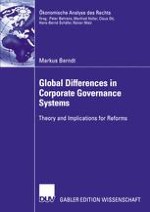2002 | OriginalPaper | Chapter
Dispersed Control - the Outsider System
Author : Markus Berndt
Published in: Global Differences in Corporate Governance Systems
Publisher: Deutscher Universitätsverlag
Included in: Professional Book Archive
Activate our intelligent search to find suitable subject content or patents.
Select sections of text to find matching patents with Artificial Intelligence. powered by
Select sections of text to find additional relevant content using AI-assisted search. powered by
In firms that operate under the corporate governance strategy of dispersed control, agency costs of are mainly mitigated through a market for corporate control (Hart, 1995). The logic of this is as follows. If the external environment and the particulars of a young firm that is about to go public render dispersed control the optimal governance strategy, a seller at an IPO has an incentive to choose the optimal institutional arrangements for this control strategy in order to maximize the price that she can attain. As shown by Grossman and Hart (1988), such optimal institutional arrangements include one-share-one-vote provisions. This allows the optimal functioning of the takeover market. If, later on, the management extracts too many private benefits (e.g., through excessive empire building or leisure), the share price drops, and the company becomes a takeover target. In order to get control over the deficient firm, an acquirer has to buy the majority of both cash flow and control rights.
